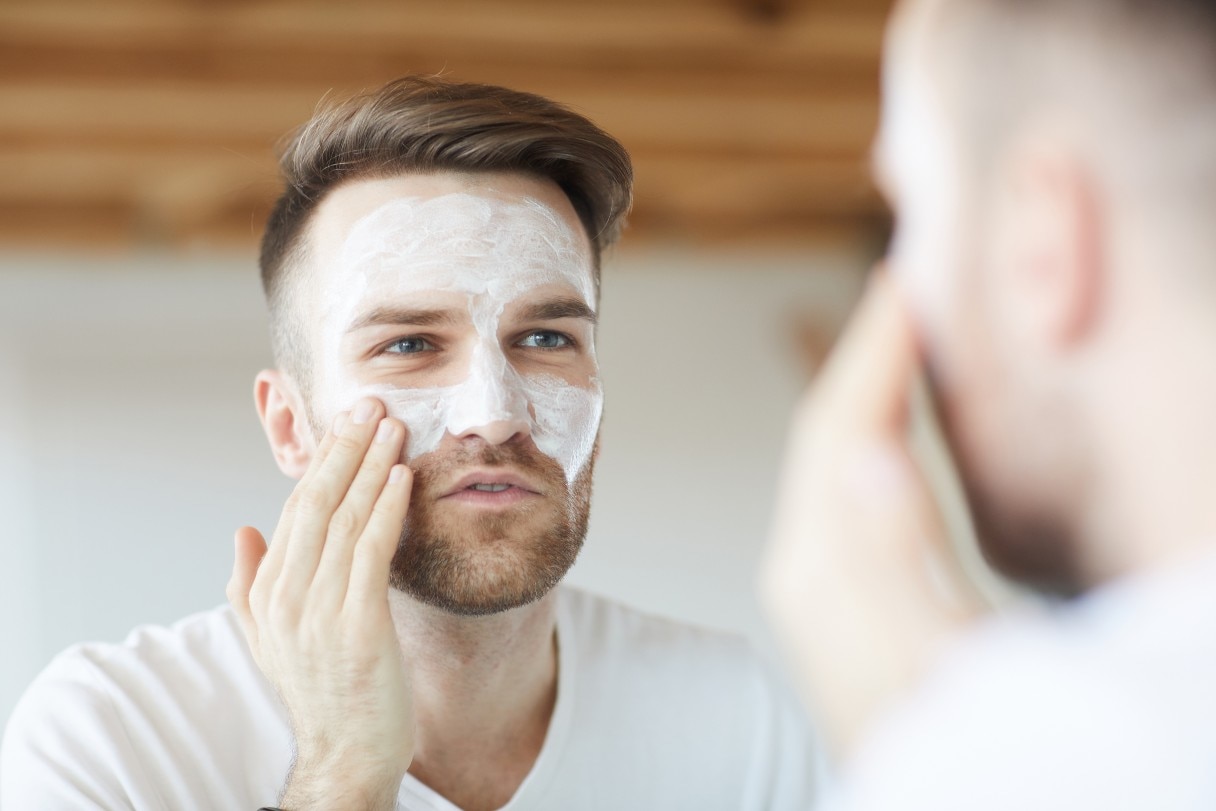Perioral dermatitis is an inflammatory skin condition that's often mistaken for acne, and has a wide variety of triggers that range from toothpaste to cosmetics. This unsightly rash is not only embarrassing to deal with but uncomfortable, too.1
While there is no cure for perioral dermatitis, with medical treatment from a dermatologist it can go into remission for months or years. Here, we look at the treatments available for this scaly skin rash and how much to expect to pay for them.
What Is Perioral Dermatitis?
Perioral dermatitis is a type of skin condition that resembles acne and typically appears around the mouth.2 The affected skin may become red, flaky, itchy and may burn as well.1 Along with these symptoms, small pus-filled bumps that resemble pimples—known as pustules—will form.1
This type of dermatitis may also appear around the nose, eyes, eyelids or genitals, and it can move to the neck, body and limbs, too.1
While perioral dermatitis can affect anyone, it primarily occurs in light-skinned women between the ages of 20 and 45 years old. It's also common in very young children between 7 months and 13 years old.1
Perioral dermatitis has no cure, but is not contagious.2 Your dermatologist can treat it to help get it into remission.3
Types of Perioral Dermatitis
There are three types of perioral dermatitis:1
- Typical perioral dermatitis appears as a rash with small red papules.
- Granulomatous perioral dermatitis primarily affects children and appears as a rash with yellowish papules instead of red ones.
- Lupoid perioral dermatitis appears as a rash with larger, more dense red-brown papules that can lead to permanent scarring without treatment.
Causes of Perioral Dermatitis
Perioral dermatitis of any form has many possible triggers, which are typically environmental causes, including:3
- Topical steroids
- Inhaled steroid nasal sprays
- Some types of facial moisturizers
- Toothpaste containing fluoride
- Chewing gum
- Dental fillings
- Bacteria
- Candida albicans, a type of fungus
- Demodex mites
- Hormonal changes
- Oral contraceptives1
- Problems with the natural skin barrier1
- An imbalance of the skin's natural microflora
- A contact allergy2
Diagnosing Perioral Dermatitis
Your dermatologist will visually examine the affected areas to determine if perioral dermatitis is the cause of your skin irritation. Prior to prescribing a treatment plan, your dermatologist may take a skin culture or biopsy to rule out other types of dermatitis.3
They might also recommend allergy testing if they feel an environmental or chemical cause triggered your condition. This is done by performing patch testing on your skin to see if you react to any chemicals that could trigger your perioral dermatitis.1
Perioral Dermatitis Treatments
The treatments that your doctor may recommend for your perioral dermatitis are dependent on its cause. While your dermatologist may likely recommend a prescription product to help treat your perioral dermatitis, they may also propose some changes to your daily routine and the products that you use.2
Prescription treatments
Typically, in addition to lifestyle changes, your doctor or dermatologist may prescribe topical products for mild cases and oral medications for more serious cases that don't respond to a topical treatment alone.3
For those prescribed an oral treatment, topical treatments are also used concurrently to help clear up your perioral dermatitis. The topical and oral treatments available to treat perioral dermatitis include:3
- Topical antibiotic treatments such as metronidazole cream or gel, erythromycin gel and clindamycin lotion or gel
- Topical sulfur preparations
- Topical calcineurin inhibitors like tacrolimus ointment or pimecrolimus cream
- Retinoids such as adapalene and low-dose isotretinoin
- Photodynamic therapy using 5-aminolevulinic acid as a photosensitizer
- Oral antibiotics including tetracycline, doxycycline, minocycline and erythromycin
Lifestyle changes
Many types of products can trigger an outbreak of perioral dermatitis. That's why your doctor may also recommend that you stop using the following:
- Any topical steroid creams, including over-the-counter cortisone creams2
- Steroid-based nasal sprays
- A scented facial cleanser2
- Cosmetics or sunscreens5
- Facial moisturizers and other skin care products5
- Toothpaste containing fluoride
- Chewing gum
- Oral contraceptives
Additionally, your doctor may recommend that you:
- Use a non-soap cleanser to wash your face.5
- Switch to a fluoride-free toothpaste.5
- Switch to fragrance-free facial products.2
Potential Side Effects of Perioral Dermatitis Treatments
As with any medication, there are possible side effects of the antibiotics prescribed to treat perioral dermatitis.6 If you are taking any medications, let your doctor know, as they could cause negative interactions with the treatments your doctor prescribes, even over-the-counter drugs and herbal supplements.
Note that oral retinoids should not be taken if you're pregnant or nursing. These could also cause serious side effects, including muscle and joint pain; liver or pancreas issues; and serious skin issues like epidermal necrolysis and Stevens-Johnson syndrome.7
Possible side effects of treatments include:6
- Diarrhea
- Nausea
- Skin rashes
- Yeast infections
- C. diff infection
- An allergic reaction, sometimes life-threatening
- Skin irritation and sensitivity to light8
- Other bacterial, fungal and viral infections9
Perioral Dermatitis Treatment Costs
The amount you'll pay for your perioral dermatitis treatment will depend on what your doctor recommends. In many cases, you may have to apply more than one topical treatment or use a topical treatment in conjunction with an oral one, which can increase your costs.
You'll find the average costs of perioral dermatitis treatments in the table below.
| Perioral dermatitis treatment | Average cost |
|---|---|
| Metronidazole cream (45-gram tube of 0.75%) | $82.28 to $92.9310 |
| Metronidazole gel (60 grams of 1%) | $98.2210 |
| Erythromycin gel (60 grams of 2%) | $42.8511 |
| Clindamycin lotion (60 milliliters of 1%) | $40.2912 |
| Clindamycin gel (60 grams of 1%) | $33.01 to $60.4912 |
| Azelaic acid gel (50 grams of 15%) | $106.4913 |
| Sulfacetamide cream (28 grams of 10%–5%) | $110.31 to $128.7914 |
| Tacrolimus ointment (60 grams of 0.1%) | $149.6915 |
| Pimecrolimus cream (30 grams of 1%) | $93.0816 |
| Adapalene gel (45 grams of 0.3%) | $77.35 to $104.5317 |
| Isotretinoin (30 25-milligram capsules) | $942.94 to $1,173.3718 |
| Photodynamic therapy | $650 per treatment19 |
| Tetracycline (60 500-milligram capsules) | $256.1920 |
| Doxycycline (30 100-milligram capsules) | $56.1721 |
| Minocycline (30 100-milligram capsules) | $36.1022 |
| Erythromycin (30 250-milligram tablets) | $128.5623 |
| Allergy testing | $400 to $6954 |
Topical antibiotic treatments
The first option your doctor will try to treat your perioral dermatitis is a topical antibiotic treatment to reduce inflammation and possible infection, including:3
- Metronidazole cream or gel
- Erythromycin gel
- Clindamycin lotion or gel
Topical sulfur preparations
Sulfur preparations such as sulfacetamide1 are commonly prescribed for perioral dermatitis, along with other skin conditions such as seborrheic dermatitis, acne and rosacea.14
Some medical professionals classify perioral dermatitis as a variant of rosacea, which is why treatments are similar for both conditions.3
Topical calcineurin inhibitors
Topical calcineurin inhibitors like tacrolimus ointment or pimecrolimus cream are also used for treatment.3 They are immunosuppressants and can help with skin conditions like perioral dermatitis if it's related to an autoimmune condition.9
Retinoids
These medications are related to vitamin A.7 Retinoid medications not only treat acne, but may help with your perioral dermatitis:3
- Adapalene
- Low-dose isotretinoin
Photodynamic therapy
Your doctor may prescribe photodynamic therapy using 5-aminolevulinic acid as a photosensitizer to treat your perioral dermatitis.3
- Photodynamic therapy makes use of light energy along with chemicals called photosensitizers to treat a number of skin conditions, including skin cancer, skin lesions and skin growths like moles.8
- Therapy costs depend on the number of treatments and the size of the area treated.8
Oral antibiotics
After prescribing a topical treatment or combination of treatments, your doctor will likely prescribe an oral antibiotic to use in conjunction with a topical treatment. Possible oral antibiotics include:3
- Tetracycline
- Doxycycline
- Minocycline
- Erythromycin
Allergy testing
While not a treatment per se, if your doctor feels that something in your environment is causing your perioral dermatitis, part of your treatment will involve allergy testing to help eliminate this.1
Your dermatologist may perform the testing or refer you to an allergist, who will perform patch tests of various potential allergens.1
Does Insurance Cover Treatment for Perioral Dermatitis?
Yes, health insurance may cover dermatology visits for skin conditions including perioral dermatitis and other forms of dermatitis, although you may need a referral from your primary care physician before your visit.24
- Your insurance will likely cover any allergy testing your doctor recommends.4
- Your health insurance plan will typically cover most medications prescribed for your treatment. If a medication isn't covered, your plan may still cover it if your doctor submits the paperwork required for an exception.25
- Some medications, such as adapalene, are available without a prescription if your insurance provider does not cover them.26
- Treatments such as photodynamic therapy may be covered by your insurance.8
- To find out if your insurance will cover the treatment that your doctor recommends for your perioral dermatitis and see what copays you may be responsible for, you'll need to contact your insurance provider directly.
How Does Treatment for Perioral Dermatitis Work?
Because treatment for perioral dermatitis typically involves topical and oral medications, there are no special preparations you need to make with your doctor. If your doctor recommends photodynamic therapy, you'll need to go to their office for treatments, but no preparation is required.
Typically, you'll apply topical treatments once or twice a day and take any oral medications once or twice a day as well. Note that treatment will last a minimum of around three months and may extend longer. You will likely need to use more than one type of treatment at the same time.3
CareCredit Credit Card Financing for Perioral Dermatitis Treatments
The CareCredit credit card makes it easy to pay for dermatology visits, over-the-counter treatments and prescription medications at locations within the CareCredit network.* Start enhancing your skin today and find a dermatologist near you that accepts CareCredit. Continue your wellness journey by downloading the CareCredit Mobile App to manage your account, find a provider on the go and easily access the Well U blog for more great articles, podcasts and videos.
In addition to dermatology, you can also use your CareCredit credit card for other cosmetic procedures, dentistry, pet care, vision, hearing, health systems, pharmacy purchases, spa treatments and so much more within the CareCredit network. How will you invest in your health and wellness next?
Author Bio
Susan Paretts is a freelance writer with 19 years of experience covering health and wellness, pet care and more. Her work has been published by the American Kennel Club, Bayer Animal Health, Elanco, LIVESTRONG.com, The San Francisco Chronicle, Chewy and more.







